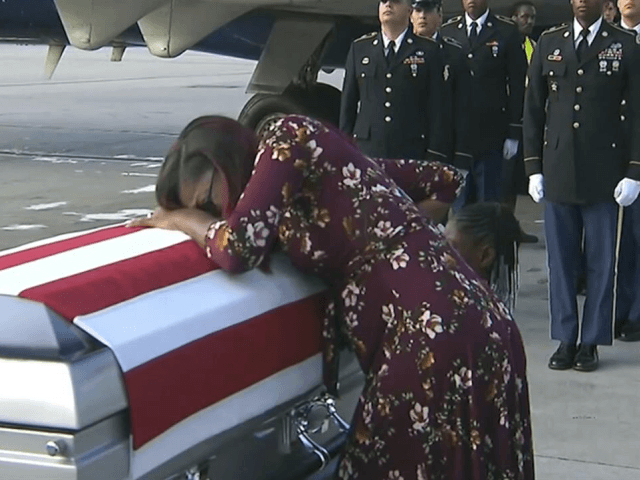The killing of four U.S. soldiers in an ambush attack in Niger has both citizens and congressional representatives asking questions about the American military presence in that country.
Senate Armed Services Committee Chairman John McCain (R-AZ) went so far as accusing the Trump administration of being less than “upfront” about the attack and hinting that his committee might launch an investigation.
U.S. troops were actually deployed to Niger under the Obama administration. In 2013, President Obama sent a letter to Congress explaining that about 100 troops were sent to “provide support for intelligence collection and will also facilitate intelligence sharing with French forces conducting operations in Mali, and with other partners in the region.”
Much of this support was meant to be provided with unmanned drones. A Pentagon official said at the time that UAVs were sent to Niger to “support a range of regional security missions and engagements with partner nations,” to “promote regional stability” and “strengthen relationships with regional leaders committed to security and prosperity.”
Nearby Mali was a major security concern in 2013, following a major al-Qaeda military offensive and a military response by France. Niger’s government specifically granted the United States permission to launch surveillance drones that would monitor al-Qaeda militants in Mali and the Sahara. French helicopter support for the operation in Mali was also launched from Niger.
The U.S. Defense Department believes the ambush on October 5 was carried out by fighters from a branch of the Islamic State, which is also a threat in the region. The affiliate in question, ISIS in the Greater Sahara (ISIS-GS), is an al-Qaeda offshoot that pledged allegiance to the leader of the Islamic State in 2015.
Yet another terrorist group of great concern is Jamaat Nusrat al Islam wal Muslimin (JNIM), whose name means “The Group to Support Islam and Muslims.” JNIM is an al-Qaeda splinter group active in Algeria, Mali, and Burkina Faso as well as Niger.
In a profile of JNIM, Stratfor explains that the region features a combination of weak governments, bitterly divided ethnic groups, pervasive corruption, poverty, and rough terrain ideal for hiding insurgent forces. The collapse of Libya in the catastrophic aftermath of President Obama’s invasion exacerbated the problem by flooding the region with Libyan weapons and seasoned militants.
There is much work for counter-terrorism forces to do in the area, and Niger provides a good base of operations thanks to its infrastructure, geographic location, and cooperative government.
The terrorists are well aware of this and have become experienced at ambushing military patrols. Extremist groups are also interested in Niger because it provides transit routes between North Africa and the sub-Saharan region. CNN quotes a U.S. official who said ISIS is “attempting to illegally infiltrate the gold mining industry in Niger to sell on the black market and finance world terrorism.”
Reuters worried about “Africa mission creep” after the October 5 attack, citing the death of a U.S. Navy SEAL in a raid against Somalia’s al-Shabaab in May and the training of local troops to combat Nigeria’s Boko Haram as other examples.
As for Niger, the current deployment is said to have grown to about 800 troops, with what one military official described as a “pretty broad mission” to increase the ability of Niger’s forces to “stand alone and prosecute violent extremists.” The team that came under attack was using unarmored vehicles to attend a meeting with local leaders after military intelligence judged it “unlikely” they would encounter enemy forces, according to an official who spoke to CNN.
The Niger force is not very large as military deployments go, so charting its growth is somewhat difficult. In a June 2016 letter to Congress, President Obama specified the number of personnel deployed to Niger as “approximately 420.” President Trump’s report to Congress one year later said “approximately 645.” Four months later, the Pentagon is reporting 800.
ABC News reports that troops deployed to Niger are currently divided between running a drone base near the capital of Niamey, building a second drone base in the northern desert, and training local military forces. “There are an additional 300 U.S. military personnel in neighboring Burkina Faso and Cameroon doing the same thing. They are there as part of what’s known as the mission in the Lake Chad Basin,” the report adds.
Besides the mounting threats from groups like Boko Haram, ISIS, al-Qaeda and its offshoots, and the other extremist threats that can be monitored from Niger, the mission might be creeping because things are not going terribly well in Mali. French forces enjoyed early successes, but have encountered difficulty suppressing dispersed insurgent forces employing terrorist tactics, especially since they seem able to move so freely throughout the region, finding support from local factions wherever they go.
American bases and special forces troops might prove very handy if insurgents take another shot at toppling the governments of Mali or Algeria. The latter was the original objective of the JNIM group, which wanted to create its own Islamic State. If operations are already quietly underway to thwart such major extremist operations, it might be something the Pentagon and White House are not eager to discuss in detail.
AFRICOM has dispatched a team of investigators to Niger to evaluate the situation and determine why there was “tremendous confusion” during the ambush, as one official put it to NBC News. An operational pause has been ordered while the investigation is completed. Among the confusing details to be sorted out is the curious lack of reconnaissance support for the special forces team, and the shifting account of whether the dead and wounded were evacuated by the French military, the U.S. military, or a U.S. military contractor.

COMMENTS
Please let us know if you're having issues with commenting.